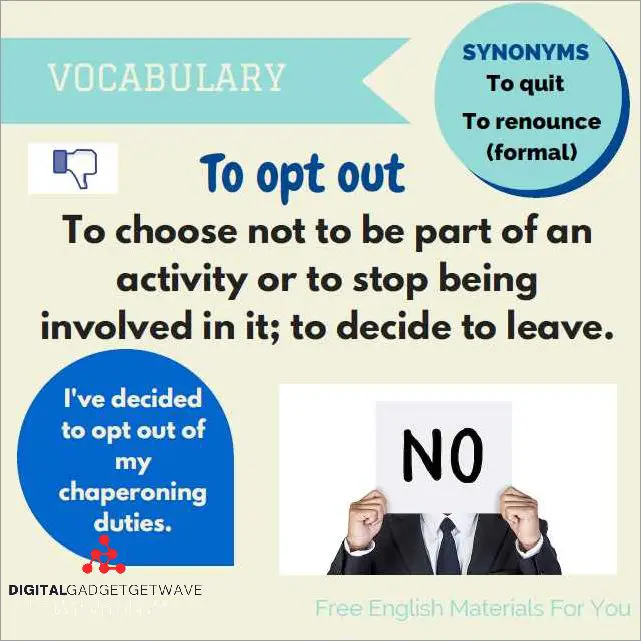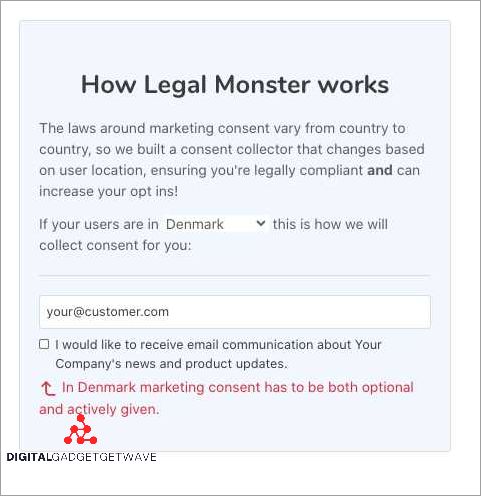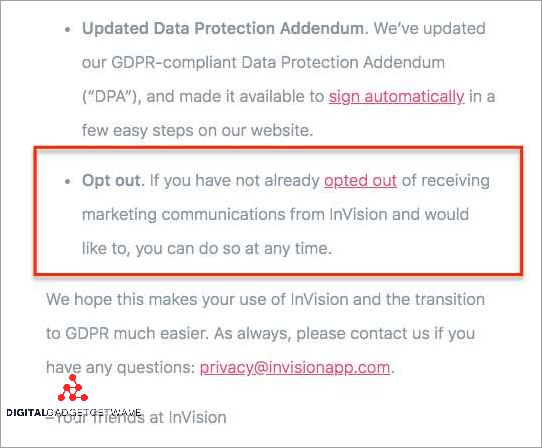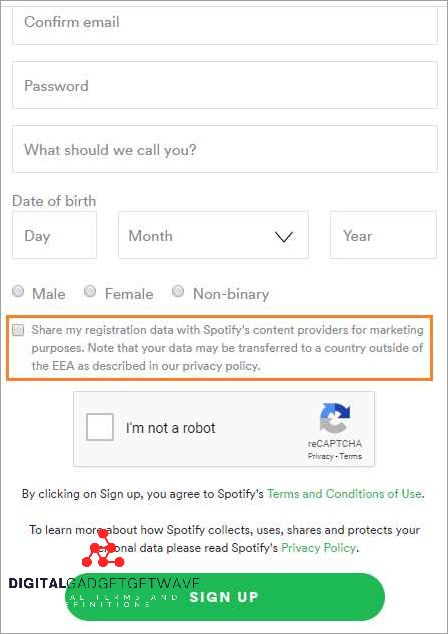
Opting out, also known as a waiver, nonparticipation, or decline, refers to the act of actively avoiding or dissenting from a particular decision or action. It is a conscious disavowal or withdrawal of participation, often due to a disagreement, disapproval, or personal choice.
When someone opts out of something, they are actively rejecting or canceling their involvement or agreement. This denial or decision to abstain from a specific activity or situation is often a result of a disagreement, disapproval, or a personal choice for forbearance or refusal.
The opt out meaning can be seen in various contexts, such as opting out of a subscription, opt-out policies for data collection, or opting out of certain activities or programs. It is an individual’s choice and right to opt out to protect their privacy, exercise their independence, or disagree with a particular practice or policy.
In summary, opting out is a deliberate act of disengagement or disapproval, where an individual chooses to withdraw their participation or agreement. It is an expression of personal autonomy and the right to make decisions based on one’s own values, beliefs, and preferences.
Contents
- 1 The Basics of Opting Out
- 2 Opt Out Methods and Tools
- 3 Benefits and Drawbacks of Opting Out
- 4 Opting Out: A Personal Choice
- 5 FAQ about topic “Understanding the Opt Out Meaning: A Simplе Explanation”
- 6 What does “opt out” mean?
- 7 Why would someone want to opt out of something?
- 8 Is opting out always a permanent decision?
- 9 How does the opt-out process work?
- 10 Are there any consequences of opting out?
The Basics of Opting Out

Opting out refers to the act of refusing or disavowing participation, giving individuals the power to choose to withdraw from a particular activity or agreement. It is an expression of dissent or disapproval, allowing individuals to exercise their right of nonparticipation or forbearance.
When opting out, individuals make a conscious decision to cancel or decline their involvement in a specific event or agreement. This can manifest in various forms such as rejecting an invitation, opting out of a mailing list, or abstaining from a particular action or behavior.
Opting out can also involve signing a waiver or agreement that signifies the individual’s denial or disapproval of certain terms or conditions. By doing so, individuals assert their right to make a decision that aligns with their personal preferences or beliefs.
Denying participation through opting out grants individuals the freedom to exercise control over their own choices and avoid situations or activities that they do not wish to be a part of. It empowers individuals to prioritize their own values and preferences, ensuring that their needs are met and respected.
In summary, opting out is an act of choice and refusal, allowing individuals to withdraw or abstain from a particular activity or agreement. It is a means for individuals to exercise their dissent, disapproval, or nonparticipation, providing them with the freedom to make decisions that align with their own personal meaning and preferences.
What is Opt Out?
Opt Out refers to the decision or choice to waive or abstain from participation in something. It is the act of choosing not to opt in or canceling one’s involvement in a particular activity or agreement.
Opting out can be seen as a form of forbearance, where an individual or entity decides to withdraw or decline participation. It is a deliberate action taken to express disagreement, dissent, disavowal, disapproval, or refusal.
Opting out is a way of expressing a lack of consent or agreement with a particular situation, policy, or system. It allows individuals to exercise their right to make their own choices and avoid being bound by something they do not agree with or support.
The decision to opt out can be motivated by various factors, such as personal beliefs, values, interests, or a disagreement with the terms and conditions of a certain agreement or arrangement. It allows individuals to assert their autonomy and assert their individual preferences and priorities.
Opting out can take different forms depending on the context. It can involve unsubscribing from a mailing list, canceling a subscription or membership, declining an invitation, or choosing not to participate in a particular activity or program.
Why Opting Out Matters
Opting out is a decision that holds great importance in today’s society, as it signifies a person’s disagreement or disapproval of a particular situation or action.
By choosing to opt out, individuals decline or abstain from participating in a certain activity or event, signaling their refusal or denial of its meaning or purpose.
This act of withdrawal or disavowal is an exercise of personal choice and freedom, highlighting the importance of individual autonomy and decision-making.
Opting out is an act of forbearance, as it allows individuals to avoid or cancel their involvement in something they consider unfavorable or objectionable.
Furthermore, opting out can be a powerful tool for expressing dissent or disapproval, enabling individuals to make their voices heard and challenge prevailing norms or practices.
By opting out, individuals can also signal their refusal to conform to societal expectations or pressures, choosing to prioritize their own values and beliefs over what is commonly accepted or expected.
In some cases, opting out can also be a form of protection, allowing individuals to exercise their right to privacy and control over their personal information or data.
Overall, opting out matters because it empowers individuals to make choices that align with their own values and beliefs, and enables them to assert their autonomy and independence in a world where conformity often prevails.
Opt Out Methods and Tools
The opt-out meaning refers to the act of avoiding or choosing nonparticipation in a particular activity or agreement. There are various methods and tools available to exercise this choice, depending on the context and the specific situation.
One common opt-out method is through explicit communication of disagreement or disapproval. This can be done through a formal disavowal or by expressing dissent verbally or in writing. By clearly stating one’s refusal or disagreement, individuals can opt out of a particular decision or agreement.
Another way to opt out is through abstainance or forbearance. This means consciously choosing not to partake in a specific action or choice. By exercising self-control and refraining from participating, individuals can effectively opt out and demonstrate their decision to not be involved.
In some cases, opt-out options are provided by organizations or through legal means. This can include specific forms or waivers that individuals can fill out to formally state their denial or intention to withdraw from a particular situation or agreement.
Technology also plays a role in opt-out methods. Many online platforms provide users with the choice to opt out of certain data collection or sharing practices through privacy settings or preferences. This empowers individuals to make an informed decision about their personal information.
Overall, opt-out methods and tools are essential for individuals to exercise their right to choice and control. Whether through explicit communication, abstaining from participation, or utilizing legal or technological means, opting out allows individuals to make decisions in line with their preferences and values.
Opt Out Through Browser Settings
Opting out of certain services or activities can be achieved by adjusting the settings in your web browser. By doing so, you can withdraw your consent or deny your participation in various online activities and services.
Browser settings allow you to abstain from certain activities by refusing to participate. When you opt out through your browser settings, it indicates your decision to avoid or reject certain practices or services that you do not approve of or agree with.
Through browser settings, you can disavow participation in targeted advertising campaigns, decline the use of cookies, or waive the collection of certain personal data. These choices reflect your disagreement with specific practices or services and allow you to exercise your right to nonparticipation.
By adjusting your browser settings, you are making a deliberate decision to refuse or reject certain online activities or services, giving you control over your online experience. This opt-out process empowers users to exercise their right to disapproval or dissent. It allows individuals to express their preferences and protect their privacy.
Browser settings offer a convenient and accessible way to opt out of various online activities and services. Taking advantage of these settings allows you to exercise your right to choice and make informed decisions about your online presence.
Opt Out with Ad Blockers
Ad blockers provide a way for users to withdraw from or express dissent about digital advertising. They allow individuals to exercise their opt-out right, which means the ability to choose not to receive certain advertisements or content. Opting out using ad blockers involves the installation of software that blocks or filters advertisements from being displayed on websites or applications.
The meaning behind ad blockers is to give users the power to express their disapproval or decline towards online advertising. By opting out with ad blockers, individuals can avoid seeing unwanted ads and have more control over the content they consume. This form of disagreement with intrusive or irrelevant advertising is becoming increasingly popular among internet users.
Ad blockers provide a waiver from intrusive ads, allowing individuals to exercise their right to denial. They enable nonparticipation in the advertising ecosystem by blocking or hiding advertisements. This disavowal of advertising can be seen as a choice to abstain from being targeted or influenced by commercial messages, offering users a more ad-free experience.
By using ad blockers, individuals can refuse to allow advertisements to be displayed on their device or browser. This refusal can be seen as a decision to cancel the intrusion of advertising into one’s online experience. Ad blockers provide the forbearance to avoid advertising, enabling users to browse the web without being bombarded by unwanted promotional content.
Opt Out Policies and Regulations
Opt out policies and regulations provide individuals with the right to refuse, cancel, or waive their participation or agreement in a specific action or decision. This allows individuals to abstain or reject a certain course of action, based on their own personal choices and beliefs.
The meaning behind opt out policies and regulations is to ensure that individuals have the freedom to voice their disagreement or disavowal on matters that directly affect them. These policies provide a platform for expressing disapproval or avoidance of certain activities or decisions without facing any penalties or repercussions.
Opting out gives individuals the power to decline or withdraw from a situation or agreement without being forced into it. This choice allows individuals to exercise their right to nonparticipation and make decisions based on their own beliefs and preferences.
Dissent is an essential component of opt out policies and regulations. It encourages individuals to express their disagreement or denial of certain actions or decisions, ensuring that their voices and concerns are heard. This dissent can help shape policies and regulations in a more inclusive and representative manner.
Overall, opt out policies and regulations empower individuals to make choices that align with their values and beliefs. It allows for a diverse range of perspectives and ensures that all individuals have the opportunity to participate or abstain from activities or decisions that directly affect them.
Benefits and Drawbacks of Opting Out
When it comes to opting out, there are both benefits and drawbacks to consider. Opting out refers to the act of declining or avoiding a particular decision or choice. It can involve canceling or withdrawing from something, whether it be an agreement, a subscription, or a participation in an activity.
One of the main benefits of opting out is the freedom it brings. By choosing to opt out, individuals assert their right to make their own decisions and assert their disagreement or disapproval of a certain situation. Opting out can be a powerful expression of dissent and a way to assert one’s independence.
Another benefit of opting out is the ability to prioritize one’s values and beliefs. When individuals opt out, they are making a conscious decision to reject certain choices or options that do not align with their personal beliefs or values. This can lead to a greater sense of satisfaction and fulfillment in one’s actions and choices.
However, there are also drawbacks to opting out. One drawback is the potential for isolation or exclusion. When individuals choose to opt out, they may find themselves outside of a particular group or community, which can lead to feelings of loneliness or a lack of connection. Opting out may also result in missed opportunities or experiences that could have been beneficial or enjoyable.
Additionally, opting out can sometimes be seen as a sign of nonparticipation or disavowal. This can lead to misunderstandings or even conflicts with others who may not understand or agree with the decision to opt out. There may be pressure to conform or to explain one’s choice, which can be challenging or uncomfortable.
In conclusion, opting out has its benefits and drawbacks. It can bring freedom, a sense of prioritizing values, and a way to express dissent. However, it can also lead to isolation, missed opportunities, and potential conflicts with others. Ultimately, the decision to opt out is a personal one, and individuals must weigh the pros and cons to make the best choice for themselves.
Benefits of Opting Out
Avoidance: Opting out gives individuals the ability to avoid certain unwanted situations or interactions. By choosing to opt out, people can steer clear of circumstances that may lead to disagreement or dissatisfaction.
Decision-making power: Opting out is a decision that puts the power in the hands of the individual. It allows individuals to exercise their choice and make a conscious decision to cancel or decline a particular action or agreement.
Disapproval: Opting out signifies a clear disapproval or disagreement. It serves as a way for individuals to express their dissatisfaction or disapproval of a particular situation or decision.
Protection of personal information: Opting out often involves sharing less personal information, which can help protect individuals’ privacy and personal data from being shared or used without their consent.
Freedom of choice: Opting out gives individuals the freedom to choose what they want or do not want to participate in. It allows individuals the right to waiver, refusal, or reject something that does not align with their preferences or values.
Withdrawal from obligations: Opting out allows individuals to withdraw from certain obligations or commitments. It provides a means for individuals to disavowal or deny their involvement in something they no longer wish to be a part of.
Disassociation: Opting out enables individuals to disassociate themselves from a particular group, organization, or belief system. It allows them to dissent or demonstrate their disagreement by choosing to abstain or withdraw their support or involvement.
Reduced stress: Opting out can lead to reduced stress levels by avoiding situations or actions that may cause anxiety, pressure, or discomfort. It provides a sense of forbearance and relief from unwanted or unnecessary obligations.
Drawbacks of Opting Out
While opting out may seem like a viable choice for individuals, it also comes with its share of drawbacks. The decision to reject or decline participation in a particular activity or agreement can have consequences that should be carefully considered.
One of the main drawbacks of opting out is the potential for disagreement or disapproval from others. When someone chooses to abstain or withdraw from a certain situation, it can lead to disagreement or even conflict with those who hold different beliefs or values.
Another drawback is the possibility of missing out on important opportunities or benefits. By opting out, individuals may be denying themselves access to valuable resources, experiences, or rewards that would have otherwise been available to them.
In some cases, opting out may also result in a loss of support or assistance. By refusing to participate, individuals may forfeit any assistance or guidance that would have been provided by the entity or organization they have chosen to opt out of.
Finally, opting out can also lead to a sense of isolation or exclusion. By choosing to withdraw or cancel participation, individuals may find themselves removed from a community or group, which can have an impact on their social connections and sense of belonging.
In conclusion, while opting out can be a valid choice for individuals, it is important to consider the potential drawbacks. The decision to opt out should not be taken lightly and individuals should weigh the potential consequences before making their final choice.
Opting Out: A Personal Choice

When it comes to certain situations in life, opting out can be seen as a personal choice. It is the act of deliberately choosing to abstain or withdraw from a particular decision, agreement, or action. Opting out can be motivated by a variety of reasons, including denial, disagreement, disapproval, or simply a desire to express one’s personal choice.
Opting out is a form of disavowal or nonparticipation, where an individual consciously decides to cancel or decline their involvement in a specific matter. It is an expression of refusal or dissent, allowing individuals to exercise their freedom to avoid participating in something they do not agree with or believe in.
Opting out is often accompanied by the need for forbearance – the act of refraining or holding back from participating. It requires the individual to make a conscious decision to remove themselves from a situation or agreement, even though they may face consequences or be in the minority.
Whether it is opting out of a mandatory program or declining to be part of a certain activity, opting out allows individuals to assert their personal choice and exercise their autonomy. It serves as a reminder that even in situations where participation is encouraged or expected, individuals have the power to make decisions that align with their values and beliefs.
Overall, opting out is a personal choice that empowers individuals to express their own beliefs and values. It is a decision that allows individuals to withdraw, abstain, or disapprove when they find themselves in a situation that does not align with their personal choice. Opting out is a form of nonparticipation that demonstrates an individual’s refusal, denial, or dissent, and promotes the idea that personal choice should be respected and valued.
Considerations Before Opting Out

Before making the decision to opt out, there are several considerations that individuals should take into account. Opting out refers to the act of refusing or avoiding participation in a particular activity or agreement. It is an expression of dissent or disapproval, indicating a choice to nonparticipate or abstain.
Firstly, it is important to understand the meaning and implications of opting out. By choosing to opt out, individuals are making a deliberate decision to decline or withdraw their involvement. This can have consequences, both positive and negative, depending on the context in which the opt out occurs.
Another consideration is the potential impact of opting out. By refusing to participate or disavowing a particular agreement, individuals may face disagreement or even denial of certain benefits or privileges. It is crucial to evaluate the possible consequences before making the decision to opt out.
Furthermore, individuals should also consider the alternative options available to them. Opting out is a choice, but it is important to explore other avenues of engagement or participation that may align more closely with one’s values or goals. This can involve practicing forbearance, exploring alternative choices, or seeking compromise.
Lastly, before opting out, individuals should carefully weigh the potential benefits and disadvantages of their decision. Opting out can provide a sense of autonomy and control over one’s choices, but it can also result in missed opportunities or exclusion from certain activities or agreements.
In conclusion, opting out is a decision that should not be taken lightly. It is important to consider the implications, potential consequences, and alternative options before making the choice to reject or abstain from a particular activity or agreement.
FAQ about topic “Understanding the Opt Out Meaning: A Simplе Explanation”
What does “opt out” mean?
“Opt out” means to choose not to participate or be involved in something, typically an activity or service.
Why would someone want to opt out of something?
There can be various reasons why someone would want to opt out of something. It could be due to personal preferences, privacy concerns, disagreement with the terms or conditions, or simply not being interested in the offering.
Is opting out always a permanent decision?
No, opting out doesn’t necessarily have to be a permanent decision. In some cases, it can be temporary, where a person chooses to opt out for a specific period of time and then rejoin later.
How does the opt-out process work?
The opt-out process can vary depending on the context. In general, it involves notifying the relevant party or organization of your decision to opt out, usually through a specific method such as filling out a form, clicking on a link, or contacting customer support. The specific instructions for opting out are typically provided by the party offering the service or activity.
Are there any consequences of opting out?
Consequences of opting out can vary depending on the situation. In some cases, opting out may result in not being able to enjoy certain benefits or services. For example, if you opt out of receiving marketing emails, you may miss out on exclusive offers or promotions. However, opting out is often a way to assert control over your preferences and protect your privacy.


